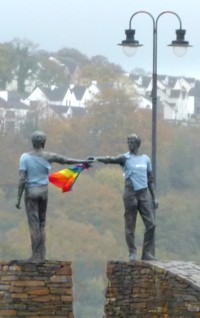Tralee
Tralee was an interesting stop. The name was familiar to me, although mainly due to my parent's generation, because of a popular Irish ballad: The Rose of Tralee, sung on B&W TV by John McCormack; Gordon MacRae; and Bing Crosby; among others. In Australia and in the US I've heard it incoherently revived when Irishmen over-imbibe Guinness or Jamison's on St. Patrick's Day.
| The pale moon was rising above the green mountain, The sun was declining beneath the blue sea; When I strayed with my love to the pure crystal fountain, That stands in the beautiful Vale of Tralee. She was lovely and fair as the rose of the summer, Yet 'twas not her beauty alone that won me; Oh no, 'twas the truth in her eyes ever dawning, That made me love Mary, the Rose of Tralee. ... In the far fields of India, 'mid war's dreadful thunders, Her voice was a solace and comfort to me, But the chill hand of death has now rent us asunder, I'm lonely tonight for the Rose of Tralee. She was lovely and fair as the rose of the summer, Yet 'twas not her beauty alone that won me; Oh no, 'twas the truth in her eyes ever dawning, That made me love Mary, The Rose of Tralee. |
In Ireland, as a result of the song's popularity, Tralee now holds the annual Rose of Tralee International Festival a beauty contest, which in these more enlightened times is said to have widened the original beauty pageant to a celebration of Irish culture and endeavour - it's definitely not a patriarchal, objectification of feminine pulchritude.
Yet despite this annual parading of nubile young women before potential consumers and its coastal location, Tralee was not founded by Vikings. It was the Anglo-Norman Earls of Desmond in the 13th century after the Norman Invasion of Ireland (see the history above...) who were responsible. For three centuries the Earls of Desmond owed fealty to the English crown but by the 16th century that was wearing thin and they now saw themselves as Lords in their own right.
As we learned from the plaque in Dingle, James FitzGerald, the 10th Earl of Desmond, offered fealty and half of Ireland to Spain in 1529. He was antagonistic to the English Court and earlier plotted against Henry VIII with King Francis I of France. Henry was well aware of his antipathy but the Earl was powerful at home. He maintained a well-disciplined, trained and equipped local army and was said to keep: 'better justice throughout his dominions than any other chief in Ireland. Robbers and homicides find no mercy, and are executed out of hand.' Although he was still young and said to be a fit man of above average height (as was Henry at the time) less than two months after signing his pact with Charles V, James FitzGerald died. The cause of death is not recorded on the WWW. Yet it is recorded that the 11th Earl was then obliged to swear loyalty to Henry and provide his grandson as a Court Page in London as a token of good faith. The poor lad was later murdered when visiting Ireland, removing this constraint.
Concurrent with the founding of the Norman town of Tralee, in 1243 a Dominican Monastery was established. After the Reformation the Earls of Desmond remained staunchly Catholic, gaining much of their authority and popular support from the Roman Church in Ireland and, as did the entire European Aristocracy, from 'the divine right of kings'.
Under Henry the Christian faith of the English Court changed (see the history above...) and the monasteries became subject to dissolution. Then, in the time of Elizabeth I, Spain began a long war with England aimed at re-establishing the Church of Rome. All this ungodliness in England, Scotland and the major cities of Ireland led to the 'Desmond Rebellions'. In 1583 the 15th Earl was defeated and killed by Tudor forces loyal to Elizabeth, who benefited from: Dieu et mon droit. But the struggle continued during the 'nine years war' until, apparently ignominiously abandoned by the deity, the last Desmond was defeated in 1603.
In the 19th century Tralee was badly hit by the potato famines. Then, a century later, Tralee was riven by sectarian and class strife in bitter battles between the Black and Tans and the IRA (see the history above...). One of the casualties of this contretemps was the statue of a 'pikeman' (18th century foot soldier) commemorating the Desmond uprisings against British rule. It was dragged down by loyalists but is now replaced with a better one, in pride of place in the main shopping square.
Today Tralee's a peaceful little town. Wendy wanted to explore a couple of retailers while I had a look around town and 'The Pikeman' turned out to be a good assembly place, before returning to the car.
Probably meeting the same fate as the earlier Pikeman, not even the ruins of the 13th century Dominican Monastery remain in Tralee. But according to a search on-line the site of a much more recent Christian Brothers Monastery, now closed like so many others, is offered for commercial development.

